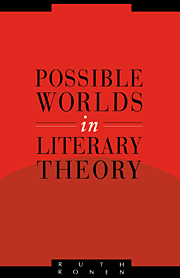Book contents
- Frontmatter
- Contents
- Acknowledgments
- Introduction
- 1 Possible worlds, fictional worlds
- 2 The possibility of fictional worlds
- 3 The Fictionality of fictional worlds
- 4 Fictional entities, incomplete beings
- 5 Fictional events and the intricacies of plot
- 6 Focalization and fictional perspective
- 7 Fictional time
- Conclusion
- Bibliography
- Index
7 - Fictional time
Published online by Cambridge University Press: 12 November 2009
- Frontmatter
- Contents
- Acknowledgments
- Introduction
- 1 Possible worlds, fictional worlds
- 2 The possibility of fictional worlds
- 3 The Fictionality of fictional worlds
- 4 Fictional entities, incomplete beings
- 5 Fictional events and the intricacies of plot
- 6 Focalization and fictional perspective
- 7 Fictional time
- Conclusion
- Bibliography
- Index
Summary
States of affairs take place in time and space, as do stories that are composed of narrativized states of affairs. Since it is the overall claim of this study that fictional worlds form parallel worlds they should, as such, be autonomous in relation to nonfictional versions of the world. The domains of space and time should likely be constructed according to the logic of parallelism, a parallelism entailing the autonomy of fictional time and space in relation to the temporality and spatiality of the actual world – assuming such an autonomy still does not circumvent possible affinities between the two world systems. Fictional events are too markedly anchored in the history and geography of the world to be appropriately accounted for by a model suggesting a breach between fiction and reality. Yet, one might ask, is the logic of parallelism not undermined by the fact that fictional space and time so markedly rely on times and places of reality? Fictional worlds are very often anchored in real times and places. In fact, fictional worlds are much more massively anchored to times and places of the real world than they are to historical figures. Whereas a historical figure rarely makes a central character in a fictional story, narratives of realistic, fantastic and even science fictional kinds, usually relate their spatio-temporal structure to the times and places of reality drawing on the chronology of world-history and on the geography of world-topography. If fictional worlds are so massively anchored in real times and places, is it valid to maintain that the fictional world posits a spatio-temporal system separate from the spatio-temporal system of the actual world?
I would claim that the autonomy of fictional spatio-temporality has to do with the logic of constructing fictional domains, and not with the content of this construction.
- Type
- Chapter
- Information
- Possible Worlds in Literary Theory , pp. 197 - 228Publisher: Cambridge University PressPrint publication year: 1994



